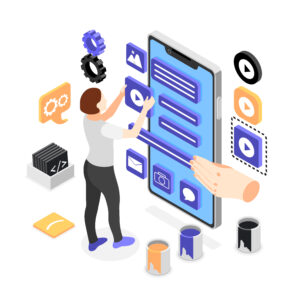Discover how mobile app development can benefit your business with our comprehensive guide. Learn about different types of apps—native, web, and hybrid—and their advantages. Explore how planning, from identifying needs to setting goals, ensures success.
Understand development options and essential features like user-friendly design, speed, security, and offline usability. Explore the importance of design, testing, launching, and post-launch activities to create an app that boosts customer engagement, loyalty, and operational efficiency. Master the tools and strategies needed for your business app to thrive in today’s digital world.
Understanding Mobile App Development
What is Mobile App Development?

Mobile app development is the process of creating software applications that run on mobile devices like smartphones and tablets. It involves writing code to build apps that can operate on various platforms such as iOS and Android. Developers use specific programming languages and tools to design, build, and maintain these apps.
There are three main types of mobile apps: native (built for a specific platform), web (accessible through a browser), and hybrid (a combination of both). Mobile app development enables businesses to offer services, engage with customers, and enhance user experiences through a convenient, portable medium.
Types of Mobile Apps: Native, Web, Hybrid
Native Apps: Developed specifically for a particular platform (iOS or Android) using platform-specific programming languages like Swift or Kotlin. They offer the best performance and user experience.
Web Apps: Essentially websites designed to look and feel like an app. They run on browsers and are written in HTML5, CSS, and JavaScript.
Hybrid Apps: Combine elements of both native and web apps. They are built using web technologies but are wrapped in a native container, allowing them to be published on app stores.
Benefits of Mobile Apps for Businesses
Enhanced Customer Engagement
Mobile apps offer a direct channel for communication between businesses and customers, fostering greater engagement through push notifications, in-app messaging, and personalized offers.
Improved Customer Loyalty
By providing consistent value through features like loyalty programs, exclusive discounts, and personalized content, mobile apps help in building and maintaining customer loyalty.
Increased Accessibility
With a mobile app, your business is accessible to customers 24/7. This constant availability can significantly enhance customer satisfaction and convenience.
Streamlined Operations
Mobile apps can integrate with various business systems (like CRM, ERP, etc.) to streamline operations, improve efficiency, and reduce operational costs.
Planning Your Mobile App
Identifying Your Business Needs
Before jumping into development, clearly identify what your business needs from the app. Whether it’s to boost sales, improve customer service, or streamline internal processes, understanding your goals is crucial.
Defining Your Target Audience
Knowing who will use your app helps in designing features that cater specifically to their needs. Consider demographics, user behavior, and preferences.
Setting Clear Objectives
Define what success looks like for your app. Set measurable goals such as user acquisition targets, engagement rates, or revenue milestones.
Choosing the Right Development Approach
Native vs. Web vs. Hybrid Apps
Each development approach has its advantages and drawbacks:
Native Apps: Offer the best performance and user experience but are costlier and time-consuming to develop.
Web Apps: Cheaper and faster to develop but lack the performance and features of native apps.
Hybrid Apps: Strike a balance between cost and performance but might not offer the best user experience.
Pros and Cons of Each Approach
Native Apps: Pros – High performance, full access to device features. Cons – Higher cost, longer development time.
Web Apps: Pros – Cost-effective, faster development. Cons – Limited functionality, dependency on browser performance.
Hybrid Apps: Pros – Balanced cost, single codebase for multiple platforms. Cons – Potential performance issues, limited access to device features.
Key Features of a Successful Business App

User-Friendly Interface
A user-friendly interface is crucial for any mobile app. It ensures that users can navigate the app easily, understand its features, and perform tasks without confusion. A well-designed interface is intuitive, with clear icons, simple navigation, and consistent design elements.
It enhances user satisfaction and retention by making the app experience smooth and enjoyable. Prioritizing a user-friendly interface helps in reducing user frustration, increasing engagement, and encouraging positive reviews and recommendations.
High Performance and Speed
High performance and speed are essential for a successful mobile app. Users expect apps to load quickly and run smoothly without lag. Optimizing the app’s performance ensures a seamless user experience, reducing frustration and preventing users from abandoning the app.
Efficient coding, minimizing load times, and regular updates contribute to maintaining high performance. By prioritizing speed and reliability, you enhance user satisfaction, boost engagement, and improve the app’s overall success in the competitive market.
Security Features
Security features are vital for protecting user data and maintaining trust in your mobile app. Implementing robust security measures, such as encryption, secure authentication, and regular updates, helps prevent data breaches and cyberattacks.
Features like two-factor authentication and secure data storage ensure that sensitive information remains safe. Prioritizing security not only safeguards your users but also enhances your app’s reputation. By addressing potential vulnerabilities and staying compliant with security standards, you build a trustworthy and reliable app that users can depend on.
Designing Your Mobile App
Importance of UI/UX Design
UI/UX design is crucial for the success of any mobile app. UI (User Interface) focuses on the app’s look and feel, ensuring it is visually appealing and easy to navigate. UX (User Experience) emphasizes how users interact with the app, aiming for a seamless and enjoyable experience.
Good UI/UX design enhances user satisfaction, increases engagement, and boosts retention rates. By prioritizing intuitive navigation, aesthetic appeal, and responsive design, you create an app that users love to use, leading to positive reviews and long-term success.
Best Practices for Mobile App Design
User experience is smooth and delightful when mobile app design best practices are followed. Start with an easy-to-use UI that is simple and straightforward. To get an overall look, keep design elements like buttons, fonts, and colors consistent. Optimize for performance and speed to make sure the app functions properly on all devices.
Make use of responsive design to accommodate different screen widths. Take customer comments into account to make ongoing changes. In order to make the software useable for everyone, including people with disabilities, accessibility should be the final priority. By adhering to these guidelines, you can produce an excellent program that people love.
Launching Your Mobile App
Launching your mobile app involves several key steps to ensure success. Start by thoroughly testing the app to identify and fix any issues. Prepare for launch by creating engaging marketing materials and setting up app store listings with compelling descriptions and high-quality visuals.
Plan a marketing strategy to promote your app through social media, email campaigns, and influencer partnerships. Optimize your app store listing with relevant keywords for better visibility. On launch day, monitor the app’s performance and user feedback closely. A well-executed launch boosts initial downloads, encourages positive reviews, and sets the stage for your app’s long-term success.
Conclusion
To sum up, creating a mobile application for your company can greatly improve client interaction, simplify processes, and accelerate expansion. You lay the groundwork for an app’s success by being aware of the different kinds of apps, making wise plans, selecting the best development methodology, and giving top priority to important aspects like security, performance, and user-friendly interfaces.
A smooth user experience is ensured by placing an emphasis on excellent UI/UX design and adhering to best practices. An effective launch strategy and extensive testing are additional factors in the success of your software. Your app will continue to assist your business in the long run if you keep an eye on it and update it frequently.

